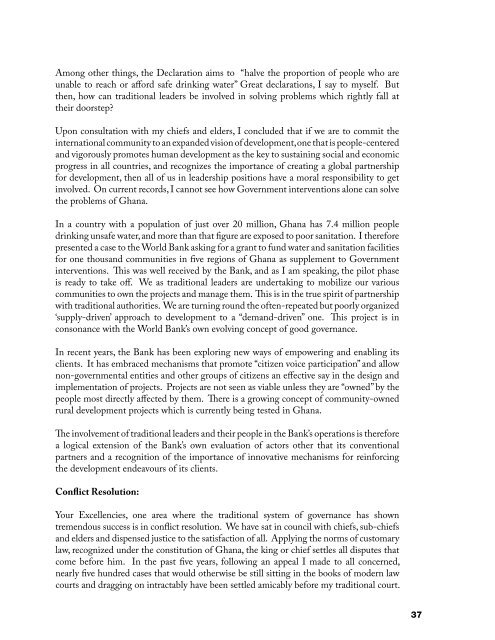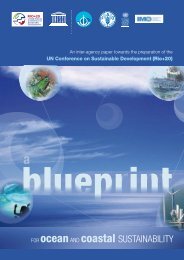Relevance of - United Nations Economic Commission for Africa
Relevance of - United Nations Economic Commission for Africa
Relevance of - United Nations Economic Commission for Africa
Create successful ePaper yourself
Turn your PDF publications into a flip-book with our unique Google optimized e-Paper software.
Among other things, the Declaration aims to “halve the proportion <strong>of</strong> people who are<br />
unable to reach or af<strong>for</strong>d safe drinking water” Great declarations, I say to myself. But<br />
then, how can traditional leaders be involved in solving problems which rightly fall at<br />
their doorstep?<br />
Upon consultation with my chiefs and elders, I concluded that if we are to commit the<br />
international community to an expanded vision <strong>of</strong> development, one that is people-centered<br />
and vigorously promotes human development as the key to sustaining social and economic<br />
progress in all countries, and recognizes the importance <strong>of</strong> creating a global partnership<br />
<strong>for</strong> development, then all <strong>of</strong> us in leadership positions have a moral responsibility to get<br />
involved. On current records, I cannot see how Government interventions alone can solve<br />
the problems <strong>of</strong> Ghana.<br />
In a country with a population <strong>of</strong> just over 20 million, Ghana has 7.4 million people<br />
drinking unsafe water, and more than that figure are exposed to poor sanitation. I there<strong>for</strong>e<br />
presented a case to the World Bank asking <strong>for</strong> a grant to fund water and sanitation facilities<br />
<strong>for</strong> one thousand communities in five regions <strong>of</strong> Ghana as supplement to Government<br />
interventions. This was well received by the Bank, and as I am speaking, the pilot phase<br />
is ready to take <strong>of</strong>f. We as traditional leaders are undertaking to mobilize our various<br />
communities to own the projects and manage them. This is in the true spirit <strong>of</strong> partnership<br />
with traditional authorities. We are turning round the <strong>of</strong>ten-repeated but poorly organized<br />
‘supply-driven’ approach to development to a “demand-driven” one. This project is in<br />
consonance with the World Bank’s own evolving concept <strong>of</strong> good governance.<br />
In recent years, the Bank has been exploring new ways <strong>of</strong> empowering and enabling its<br />
clients. It has embraced mechanisms that promote “citizen voice participation” and allow<br />
non-governmental entities and other groups <strong>of</strong> citizens an effective say in the design and<br />
implementation <strong>of</strong> projects. Projects are not seen as viable unless they are “owned” by the<br />
people most directly affected by them. There is a growing concept <strong>of</strong> community-owned<br />
rural development projects which is currently being tested in Ghana.<br />
The involvement <strong>of</strong> traditional leaders and their people in the Bank’s operations is there<strong>for</strong>e<br />
a logical extension <strong>of</strong> the Bank’s own evaluation <strong>of</strong> actors other that its conventional<br />
partners and a recognition <strong>of</strong> the importance <strong>of</strong> innovative mechanisms <strong>for</strong> rein<strong>for</strong>cing<br />
the development endeavours <strong>of</strong> its clients.<br />
Conflict Resolution:<br />
Your Excellencies, one area where the traditional system <strong>of</strong> governance has shown<br />
tremendous success is in conflict resolution. We have sat in council with chiefs, sub-chiefs<br />
and elders and dispensed justice to the satisfaction <strong>of</strong> all. Applying the norms <strong>of</strong> customary<br />
law, recognized under the constitution <strong>of</strong> Ghana, the king or chief settles all disputes that<br />
come be<strong>for</strong>e him. In the past five years, following an appeal I made to all concerned,<br />
nearly five hundred cases that would otherwise be still sitting in the books <strong>of</strong> modern law<br />
courts and dragging on intractably have been settled amicably be<strong>for</strong>e my traditional court.<br />
37
















